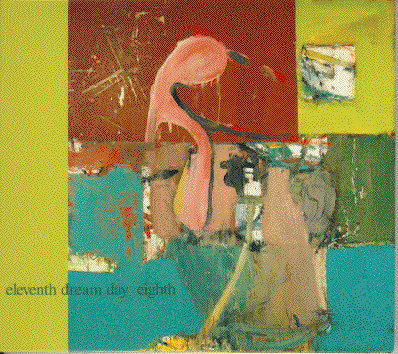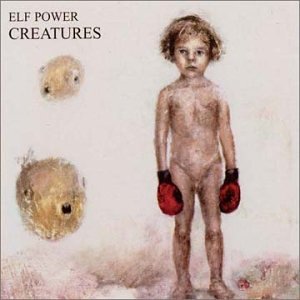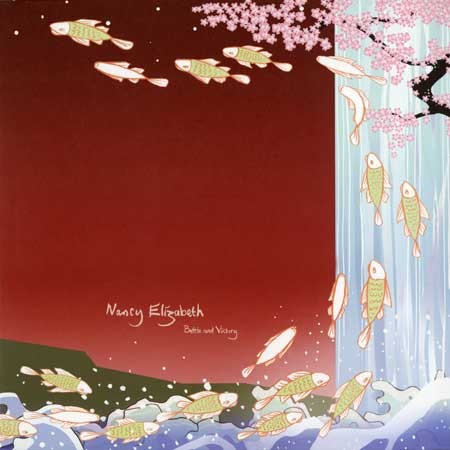
Moving even further into the post-rock genre is 1997's Eighth. It's a fine record is Eighth, full of intriguing musical constructions that are far more complicated and delicately put together than they initially sound. In fact, by this point the problems with the record are the opposite to the problems with the earlier albums: the proper rock songs were the highlights on the first few albums, but it's the more atmospheric stuff that works best here and make the straighter rock songs sound a bit forced by comparison. Although it's a less wilfully brainy effort than most post-rock outfits release, that in fact works in its favour because although Eleventh Dream Day have always been a smart band, to sound like an intellectual exercise wouldn't fit their approach at all, and there's is a more natural, more organic approach to post-rock and is all the more charming for it. The affinity with Yo La Tengo is all the more obvious on Eighth and in terms of guitar mangling, there are occasons when Eleventh Dream Day almost reach Yo La Tengo's remarkable heights.

Next in line are the psychedelic pop songs of Elf Power. As far as bands from the Elephant 6 Collective go Elf Power were pretty near the top, making some of the most whimsical yet endearing records. The trick was partly to marry a rather cutesy sound and songwriting with some truly disconserting lyrical imagery. There are some lovely tunes on A Dream in Sound (1999) and it's an appropriate title, as the whole record does indeed play like the soundtrack to a dream, alternately soothing and unnerving, never settling into a specific feel. It's lo-fi, fuzzy, but there are some superb pop songs, opener 'Will My Feet Still Carry Me Home' being among the best of them. The direct connection with other Elephant 6 bands, particularly Olivia Tremor Control comes more to the fore on next album, The Winter is Coming (2000). Better produced, yet fuzzier still and more woozily whimsical, The Winter is Coming is another development, adding more obviously dark foundations to the pop music, slowing things right down, and making the uncomfortable sense of something not right happening in the songs more intense. It's a strange combination because although it creates a wilfully odd record, it also means that you're acutely aware of the discomfort while enjoying the poppiness of the whole thing. Next should have been the B-side of 'The Naughty Villain' 7" (2000) but once again, can't find it netwise.



Much more lively is 2002's Creatures which is stuffed full of charming pop songs, most of which race by a brisk pace. There's still something creepy about the lyrics - effectively it's a concept album about unnamed things slithering about in slime and sewers (I guess that's our minds man) and it's all deeply unsettling, but the tunes are great, lively songs that are full of woozy hooks and the tottery performance simply adds to the atmosphere. Andrew Reiger's high, uncertain vocals convey his odd, imagistic ideas perfectly and as far as guitar, bass and drums combos (with occasional flutes and keyboards admittedly) go, this is all pretty inventive stuff. Elf Power have released a whole bunch of albums since Creatures but for some reason I've never picked them up. I guess it's because the record shops I used to love (Selectadisc mainly) stopped selling US indie stuff in favour of electronica and dance in the early 2000's and it got more difficult to find anything by the bands or on the labels I liked.

Elis Regina was one of Brazil's most successful and most notorious singers and she made a succession of variously fantastic albums from the age of 15 until her untimely coke and booze induced death at 36. Early in her career (at 21) the release of her seventh album, Elis (1966) didn't make any particularly great stir, everything she made sold by the bucketload by that point, but it's as good an introduction to her superb interpretive bossa nova as any other. This is the kind of stuff that couldn't really travel so well in the 60's - Elis was no smooth as silk Astrid Gilberto, she was the real deal, dirty and lively, and her samba and bossa nova wasn't tempered by US commercial interests, there are no floating sax lines to be found here, mostly just the piano, guitar and percussion that forms the foundation of all great bossa with occasional stabs of brass. In terms of approach Elis Regina's work sat halfway between the easy style of Gal Costa and the challenging experimentalism of Joyce, Regina wasn't concerned with pushing boundaries but she was interested in delivering the real thing in as earthy a way as possible and the stuff on Elis demonstrates just how brilliant she was at doing just that.

Nancy Elizabeth's Battle and Victory (2007) was a record that was cruelly ignored and what little attention it did garner was on the completely fallacious basis that she was England's answer to Joanna Newsom. Now I love the Newsom but this is something so very different that comparisons are absurd. But you see they both play the harp, so they MUST BE THE SAME, NO?? Good old music journos really are some of thickest tosspots you'll ever come across. Anyway, Battle and Victory is much more akin to a cross between avant-folk and Bat for Lashes. There's a twilit feel to the record, a deep set melancholia, but it's in no way a downer to listen to. The songs are quite simply beautiful pieces which quietly and gently unfold in truly lovely way. It is a demanding record though - if you aren't paying attention it'll go on without you, and it asks you to make the effort, but it's worth it. The harp actually only shows up on a couple of songs, and Nancy Elizabeth's multi-instrumentalists approach takes in pretty much every arcane instrument known to folk, together with sweetly arpeggiated piano and acoustic guitar, and her voice is like rougher edged Beth Orton. It's a great record and one that seems a great shame to have fallen between the cracks. Follow-up Wrought Iron (2009) is a similar proposition but it's a denser, darker record and one that is less engaging generally. There's a sense that Wrought Iron is a deeply serious record and it's certainly a greatly skilled one, but it just can't find the will to really invite the listener in.


No comments:
Post a Comment